|
Featured Event
Asian Rice Futures Market – Expert Working Group Meeting
22–23 March 2012
RSIS Centre for Non-Traditional Security (NTS) Studies
Singapore
 In September 2010, Singapore was urged to consider hosting an international rice futures market in a report produced by the International Rice Research Institute (IRRI) and the Asia Society. The authors, an international task force on rice-based food security, suggested that a rice futures exchange would stabilise rice prices and contribute to national, regional and global rice trade. Against this backdrop, the RSIS Centre for NTS Studies hosted a high-level closed-door Expert Working Group Meeting on 22–23 March 2012 to examine the viability of establishing an international rice futures market in Southeast Asia. In September 2010, Singapore was urged to consider hosting an international rice futures market in a report produced by the International Rice Research Institute (IRRI) and the Asia Society. The authors, an international task force on rice-based food security, suggested that a rice futures exchange would stabilise rice prices and contribute to national, regional and global rice trade. Against this backdrop, the RSIS Centre for NTS Studies hosted a high-level closed-door Expert Working Group Meeting on 22–23 March 2012 to examine the viability of establishing an international rice futures market in Southeast Asia.
The participants engaged in lively discussions on the logistical and financial feasibility of an international rice exchange; the likely impact on rice price formation; the costs and benefits for Southeast Asian rice economy stakeholders, including smallholder farmers; and potential locations for the exchange. The meeting was convened with support from Singapore’s National Security Coordination Secretariat (NSCS).
^ To the top
Announcements
New Executive Director at RCSS
Dr Mallika Joseph assumed the post of Executive Director of the Regional Centre for Strategic Studies (RCSS), Colombo, with effect from 1 January 2012.
 Dr Mallika has worked on various issues related to South Asian security. Her areas of interest include human security, security sector reform (SSR), international organised crime, and small arms and light weapons, among others. She specialises in SSR and was one of 24 experts inducted into the UN Roster of SSR Experts in 2009. In 2006 and 2007, she was part of the UK Department for International Development (DFID) high-level technical team that offered consultancy services on broad-based SSR engagement in Guyana; the mission resulted in an SSR Action Plan being tabled in the Guyanese Parliament and passed unanimously. Before joining RCSS, Dr Mallika was Director of the New Delhi-based Institute of Peace and Conflict Studies (IPCS). Dr Mallika has worked on various issues related to South Asian security. Her areas of interest include human security, security sector reform (SSR), international organised crime, and small arms and light weapons, among others. She specialises in SSR and was one of 24 experts inducted into the UN Roster of SSR Experts in 2009. In 2006 and 2007, she was part of the UK Department for International Development (DFID) high-level technical team that offered consultancy services on broad-based SSR engagement in Guyana; the mission resulted in an SSR Action Plan being tabled in the Guyanese Parliament and passed unanimously. Before joining RCSS, Dr Mallika was Director of the New Delhi-based Institute of Peace and Conflict Studies (IPCS).
Click here to read more about Dr Joseph.
CGIAR Consortium Attains International Organization Status
 The CGIAR (Consultative Group on International Agricultural Research) Consortium, representing the world’s largest global agriculture research partnership aimed at reducing rural poverty and hunger was officially granted International Organization status on 2 March 2012. The CGIAR (Consultative Group on International Agricultural Research) Consortium, representing the world’s largest global agriculture research partnership aimed at reducing rural poverty and hunger was officially granted International Organization status on 2 March 2012.
The agreement conferring the status was signed that day by Ms Anne Dorte Riggelsen, Ambassador of Denmark to France on behalf of her government. France and Hungary had already signed the agreement in September 2011. This signature ratifies the agreement.
‘Achieving International Organization status and recognition is a major step towards enabling the reformed CGIAR to deliver research resulting in real impact; improved food security, health and nutrition alongside sustainable management of natural resources,’ said Mr Carlos Perez del Castillo, CGIAR Consortium Board Chair, who was present at the event. He added that ‘this status will allow the consortium to operate as an independent organization, speak with one voice at an international level, establish better partnerships and raise awareness of its work at a time when agricultural research is key to the survival of a billion people.’
CGIAR is a global research partnership that unites organisations engaged in research for sustainable development. Its research is dedicated to reducing rural poverty, increasing food security, improving human health and nutrition, and ensuring more sustainable management of natural resources. Its work is carried out by 15 centres that are members of the CGIAR Consortium (the Worldfish Center is one such member) in close collaboration with hundreds of partner organisations, including national and regional research institutes, civil society organisations, academia and the private sector.
Visit www.consortium.cgiar.org for more information. |
^ To the top
Recent Events
Lecture on ‘Climate Change and Gender Vulnerability’
7 March 2012
Bangladesh Institute of Peace and Security Studies (BIPSS)
Dhaka, Bangladesh
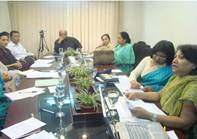 BIPSS hosted a lecture on 7 March as part of its joint project with Konrad Adanauer Stiftung (KAS), Germany, on Climate Change and Non-Traditional Security Threat. The project explores climate change impacts and human security conditions in Bangladesh in the fields of food security, water security, livelihood conditions, etc. The lecture was delivered by renowned climate change advocate, Mrs Hasna J. Moudud, Senior Fellow, Harvard University Asia Center. Leading professionals from a variety of backgrounds attended the lecture. BIPSS hosted a lecture on 7 March as part of its joint project with Konrad Adanauer Stiftung (KAS), Germany, on Climate Change and Non-Traditional Security Threat. The project explores climate change impacts and human security conditions in Bangladesh in the fields of food security, water security, livelihood conditions, etc. The lecture was delivered by renowned climate change advocate, Mrs Hasna J. Moudud, Senior Fellow, Harvard University Asia Center. Leading professionals from a variety of backgrounds attended the lecture.
Worldfish Center Participates in World Oceans Summit
22–24 February 2012
Worldfish Center
 The Economist’s World Oceans Summit, held on 22–24 February 2012, examined how the increasing activity in and around the oceans can be managed sustainably and what this means for business and other key stakeholders The Economist’s World Oceans Summit, held on 22–24 February 2012, examined how the increasing activity in and around the oceans can be managed sustainably and what this means for business and other key stakeholders
A session on ‘Feeding the World – Are the Oceans the Solution?’ explored how aquaculture and capture fisheries can contribute to meeting the challenge of feeding a projected population of 9 billion people with sustainable sources of animal protein.
In this session, Worldfish Center Director-General, Dr Stephen Hall pointed out that the growing aquaculture industry is an increasingly important complement to ocean-based fisheries, and currently provides an estimated 50 per cent of global fish supply for human consumption. However, with almost a billion people relying solely on wild fisheries for their primary source of animal protein, it is vital to also work to sustain these. Building on this theme, Dr Hall argued that sustaining the world’s oceans and seafood supplies requires that international development agencies, government departments and philanthropists further invest in improving governance for the future of global fish stocks.
Launch of ASEAN-Canada Research Partnership
20 January 2012
RSIS Centre for Non-Traditional Security (NTS) Studies
Jakarta, Indonesia
 |
| Left to right: Ms Sofiah Jamil (Associate Research Fellow, RSIS Centre for NTS Studies), Dr Rosalia Sciortino (IDRC Regional Director for Southeast and East Asia), Assoc. Prof. Mely Caballero-Anthony (Director for External Relations, Political and Security Community Department, ASEAN Secretariat), and Assoc. Prof. Ralf Emmers (Acting Head, RSIS Centre for NTS Studies). |
The ASEAN-Canada Research Partnership was launched on 20 January 2012 at the ASEAN Secretariat in Jakarta, Indonesia, during a ceremony marking the 35th Anniversary of the ASEAN-Canada Dialogue Partnership.
In their remarks, ASEAN Secretary-General, H.E. Dr Surin Pitsuwan, and Ambassador of Canada to ASEAN, H.E. Mr Mackenzie Clugston highlighted milestones in the ASEAN-Canada official partnership. From issues of political and security cooperation to trade and economics, ASEAN-Canadian relations have grown to include socio-cultural themes such as health, disaster management and climate change. These emerging fields of cooperation reflect the importance that non-traditional security issues have within ASEAN and in its discussions with its dialogue partners.
Cooperation in these emerging fields at the official Track 1 level also give the impetus to enhance efforts at the Track 2 and Track 3 levels, thereby contributing to strengthening a people-to-people community in ASEAN. The ASEAN-Canada Research Partnership therefore fills this space by seeking to build stronger research capacity and partnerships between and among Canada and ASEAN countries, institutions and individuals.
In her remarks to launch the ASEAN-Canada Research Partnership, Dr Rosalia Sciortino, Regional Director for Southeast and East Asia at the International Development Research Centre (IDRC), highlighted the objectives and main activities of the Research Partnership over the next three years. Dr Sciortino also thanked the RSIS Centre for NTS Studies, Nanyang Technological University, and the Institute for Asian Research (IAR), University of British Columbia – the two main institutes involved in the project – for their efforts and commitment to this initiative.
Conference on ‘Prospects for Peace and Security through Regional Cooperation in
21st Century South Asia: The Role of Japan’
4–5 January 2012
Bangladesh Institute of International and Strategic Studies (BIISS)
Dhaka, Bangladesh
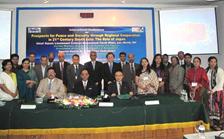 A two-day conference on ‘Prospects for Peace and Security through Regional Cooperation in 21st Century South Asia: The Role of Japan’ was organised by BIISS with the support of the Japan Foundation at the BIISS Auditorium, Dhaka, on 4–5 January 2012. A two-day conference on ‘Prospects for Peace and Security through Regional Cooperation in 21st Century South Asia: The Role of Japan’ was organised by BIISS with the support of the Japan Foundation at the BIISS Auditorium, Dhaka, on 4–5 January 2012.
The conference was held to present the final version of papers produced as the outcome of a research project undertaken a year ago with a view to determine the major challenges to regional cooperation in South Asia, and to explore Japan’s existing and potential role in the South Asian region. The aim was to fill in gaps in current research, with the research findings to be published in a book. The research was conducted by scholars from Japan, India, Pakistan, Bangladesh, Sri Lanka and Nepal.
Click here for more information on the conference.
MacArthur Dissemination Meeting on
‘Non-Traditional Security and Regional Security Cooperation’
28–29 November 2011
RSIS Centre for Non-Traditional Security (NTS) Studies
Singapore
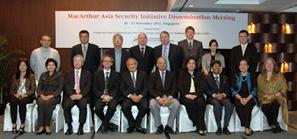 Over the course of 3 years (2009–2011), the RSIS Centre for NTS Studies coordinated cluster three of the MacArthur Asia Security Initiative (funded by the MacArthur Foundation) which focused on internal challenges in Asia. The Centre developed an active research agenda that drew on its own resources as well as that of its network partners around the region to deliver policy-relevant outputs. The research addressed many of the most pressing challenges faced by Asia’s policymaking communities, from climate change, natural disasters, and energy, to internal and cross-border conflict. Over the course of 3 years (2009–2011), the RSIS Centre for NTS Studies coordinated cluster three of the MacArthur Asia Security Initiative (funded by the MacArthur Foundation) which focused on internal challenges in Asia. The Centre developed an active research agenda that drew on its own resources as well as that of its network partners around the region to deliver policy-relevant outputs. The research addressed many of the most pressing challenges faced by Asia’s policymaking communities, from climate change, natural disasters, and energy, to internal and cross-border conflict.
To showcase the research outcomes of the project, the RSIS Centre for NTS Studies and the RSIS Centre for Multilateralism Studies co-organised the MacArthur Asia Security Initiative Dissemination Meeting on 28–29 November 2011 at the Marina Mandarin Hotel in Singapore. Participants of this meeting included prominent policymakers, Track II parties, academics, researchers and civil society representatives.
In their presentations, researchers involved in the project shared that the Centre’s research had identified a broader and more inclusive understanding of security, thus opening up policymaking to different perspectives. However, there has been a re-emergence of interest in traditional security issues in recent years, even though non-traditional security (NTS) issues are increasingly prevalent in the Asia-Pacific. This shift underlines the necessity of continuing to further evidence-based and policy-relevant research to ensure that policy gaps in responding to NTS challenges are effectively addressed.
Click here to access the speeches and presentations delivered at the meeting.
18th ASEAN-ISIS Colloquium on Human Rights (AICOHR)
12–13 November 2011
Institute for Strategic and Development Studies (ISDS)
Mandaluyong City, Philippines
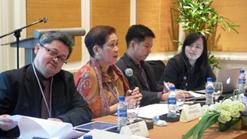 The 18th ASEAN-ISIS Colloquium on Human Rights (AICOHR) was organised by ISDS, Philippines, in November 2011. It aimed to provide a venue for examining feasible ways by which human rights networks in Southeast Asia can locate their advocacy roles for migrants’, women’s and children’s rights within the context of the ASEAN Charter, the ASEAN Intergovernmental Commission on Human Rights (AICHR) as well as the ASEAN Commission on the Promotion and Protection of the Rights of Women and Children (ACWC). It also sought to generate perspectives from human rights advocates, representatives from national human rights commissions, and participants from research networks in ASEAN member states on the promotion and protection of the rights of migrant workers, women and children in Southeast Asia. Aung San Suu Kyi, Nobel Peace Laureate and General Secretary of the National League for Democracy in Burma, delivered a special message during the colloquium. The 18th ASEAN-ISIS Colloquium on Human Rights (AICOHR) was organised by ISDS, Philippines, in November 2011. It aimed to provide a venue for examining feasible ways by which human rights networks in Southeast Asia can locate their advocacy roles for migrants’, women’s and children’s rights within the context of the ASEAN Charter, the ASEAN Intergovernmental Commission on Human Rights (AICHR) as well as the ASEAN Commission on the Promotion and Protection of the Rights of Women and Children (ACWC). It also sought to generate perspectives from human rights advocates, representatives from national human rights commissions, and participants from research networks in ASEAN member states on the promotion and protection of the rights of migrant workers, women and children in Southeast Asia. Aung San Suu Kyi, Nobel Peace Laureate and General Secretary of the National League for Democracy in Burma, delivered a special message during the colloquium.
Click here for more information on the event.
BIPPS Participates in the South Asia Network Roundtable on Climate Change and Security
1 December 2011
Bangladesh Institute of Peace and Security Studies (BIPSS)
Male, Maldives
 BIPSS President, Major-General Muniruzzaman (Retd) spoke at a roundtable organised by the South Asia Network of Climate Change and Security, at Male, Maldives, on 1 December 2011, at the invitation of the President’s Office of the Government of the Maldives, to discuss opportunities and challenges related to climate change and security in South Asia. BIPSS President, Major-General Muniruzzaman (Retd) spoke at a roundtable organised by the South Asia Network of Climate Change and Security, at Male, Maldives, on 1 December 2011, at the invitation of the President’s Office of the Government of the Maldives, to discuss opportunities and challenges related to climate change and security in South Asia.
The Network deliberated on decentralised water diplomacy, diverse causal factors of climate related migration as well as rural and urban food security, to ensure climate-sensitive food production, equitable distribution and sustainable consumption. Major-General Muniruzzaman is the co-founder of the Network, which was launched in Dhaka in 2009. The roundtable was organised in collaboration with the President’s Office of the Government of the Maldives and International Alert (an international peacebuilding organisation).
^ To the top
Recent Publications
Cyber Security: The Emerging Threat Landscape
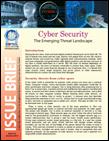 Bangladesh Institute of Peace and Security Studies (BIPSS), Issue Brief, January 2012. Bangladesh Institute of Peace and Security Studies (BIPSS), Issue Brief, January 2012.
This brief focuses on cyber security, discusses different types of cyber-attacks and explores the question of whether threats from cyberspace are an emerging threat. Cyber espionage and cyber-attacks on elementary infrastructure are only two of the topics that are discussed in this publication. |
|
Rising Inequality in China and the Move to a Balanced Economy
Cuiping Zhu and Guanghua Wan, China & World Economy, Special Issue: Rebalancing of China’s Growth,
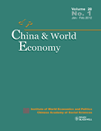 Vol. 20, No. 1, pp. 83–104, January–February 2012. Vol. 20, No. 1, pp. 83–104, January–February 2012.
China faces serious external (i.e., trade) and internal (i.e., structural) imbalances. Both are related to income inequality, a reduction of which will help to increase domestic demand. This paper discusses how income inequality has evolved over time. It notes that in order for China to achieve a balanced economy and a harmonious society, development policies must shift from emphasising growth to prioritising equality. In addition, government interventions can target rural-urban disparity through rapid urbanisation; and tackle regional inequality by developing financial markets, ensuring progressive allocation of fiscal resources, promoting trade and foreign direct investment in inland China, creating more formal jobs and supporting the service sector. |
|
Poverty Reduction in China: The Contribution of Popularizing Primary Education
Yang Song, China & World Economy, Special Issue: Rebalancing of China’s Growth,
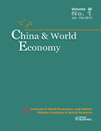 Vol. 20, No. 1, pp. 105–22, January–February 2012. Vol. 20, No. 1, pp. 105–22, January–February 2012.
Using the instrumental variable model and the regression discontinuity approach, this paper explores how access to primary education affects the Chinese labour market and helps people to escape poverty. Several important findings are noted. The popularisation of primary education has significantly reduced poverty in China, especially in urban areas. In contrast, the Compulsory Education Law has not been well-implemented for older children in rural areas. In addition, the labour market premium for completing primary education is much larger in urban areas than in rural areas. Poor rural school quality might explain this rural-urban disparity. Effort needs to be made to further reduce poverty by ensuring adequate financial resources for primary education in poor areas and improving school quality in rural China. |
|
R2P Monitor
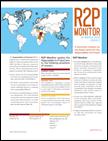 Global Centre for the Responsibility to Protect, Bulletin, No. 2, 15 March 2011. Global Centre for the Responsibility to Protect, Bulletin, No. 2, 15 March 2011.
This is a bimonthly bulletin by the Global Centre for the Responsibility to Protect which applies the Responsibility to Protect (RtoP) lens to the following situations of concern: current crisis, imminent risk and serious concern. This issue looks at Syria, Sudan, the Democratic Republic of Congo, Myanmar, Yemen and Libya, among others. |
|
Burma/Myanmar Spring: Surreal or So Real?
Noel Morada, R2P Ideas in Brief, Vol. 1, No. 2, 2011,
 Asia-Pacific Centre for Responsibility to Protect (APR2P). Asia-Pacific Centre for Responsibility to Protect (APR2P).
This brief discusses the Responsibility to Protect (RtoP) in Myanmar in light of recent political developments in the country. The author notes that the government should consider initiating a ceasefire agreement with ethnic armed groups in order to create an atmosphere that is conducive for meaningful peace negotiations. It also notes that ASEAN and the rest of the international community should help facilitate peace efforts in the country and provide assistance in peacebuilding between the government and ethnic groups. |
|
Ethnic Minority Protection in Viet Nam: An R2P Challenge
Annie Pohlman and Joanne Cotton, R2P Ideas in Brief, Vol. 1, No. 3, 2011,
 Asia-Pacific Centre for Responsibility to Protect (APR2P). Asia-Pacific Centre for Responsibility to Protect (APR2P).
This brief provides an assessment of the Responsibility to Protect (RtoP) in Vietnam and gives an overview of the government’s policies vis-à-vis ethnic minorities residing in the country's central and northern highlands. It notes that government investments have resulted in some progress on reducing poverty in many minority communities and addressing the infrastructure challenges faced by them. There are however still areas of concern, such as denial of religious freedoms, that present challenges for the Vietnamese government in terms of its upholding its responsibility to protect its ethnic minority groups. |
|
Labour Migration from Bangladesh 2011: Achievements and Challenges
Tasneem Siddiqui and Md Motasim Billah, Report, January 2012,
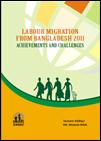 Refugee and Migration Movements Research Unit (RMMRU). Refugee and Migration Movements Research Unit (RMMRU).
Despite facing a hostile environment, Bangladesh has been able to secure a place among emerging economies for its success in several social and economic sectors. If the country's per capita gross domestic product (GDP) growth continues to grow at the current rate, it will transform into a middle-income group country within the next 15 years. The migrant sector has made an important contribution to the economy through remittances. This year, remittances constituted 13.68 per cent of GDP. In order to maintain the pace of development, it is very important to establish good governance in the migration sector. The last decade has seen successive governments taking a number of steps in this regard. This report presents the achievements of, and the challenges faced by, the sector in 2011. |
|
Facing the Challenges of Labour Migration from Bangladesh
Policy Brief, No. 4, December 2011,
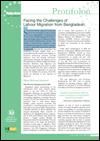 Refugee and Migration Movements Research Unit (RMMRU). Refugee and Migration Movements Research Unit (RMMRU).
Short-term labour migration has become one of the core foreign currency earning sectors in Bangladesh. Yet, the development of this sector faces challenges in terms of the lack of rights-based legal support, inadequate policies and a protracted implementation process. Female labour migration is rising, but skilled female migration, such as migrants in the nursing sector, is in need of appropriate government policy for its expansion. This brief expands on the challenges faced by this particular migrant group. |
|
The Pacific Review, Vol. 25, No. 1, March 2012
 This issue features eight papers on the Responsibility to Protect (RtoP) by an RtoP study group convened by the RSIS Centre for Non-Traditional Security (NTS) Studies under the MacArthur Asia Security Initiative, including ‘The Responsibility to Protect in Southeast Asia: Opening Up Spaces for Advancing Human Security’ by Mely Caballero-Anthony, ‘The Responsibility to Protect Norm in Southeast Asia: Framing, Resistance and the Localization Myth’ by David Capie, and ‘The ASEAN Political and Security Community (APSC): Opportunities and Constraints for the R2P in Southeast Asia’ by Rizal Sukma. This issue features eight papers on the Responsibility to Protect (RtoP) by an RtoP study group convened by the RSIS Centre for Non-Traditional Security (NTS) Studies under the MacArthur Asia Security Initiative, including ‘The Responsibility to Protect in Southeast Asia: Opening Up Spaces for Advancing Human Security’ by Mely Caballero-Anthony, ‘The Responsibility to Protect Norm in Southeast Asia: Framing, Resistance and the Localization Myth’ by David Capie, and ‘The ASEAN Political and Security Community (APSC): Opportunities and Constraints for the R2P in Southeast Asia’ by Rizal Sukma.
|
|
Feeding Asia in the 21st Century: Building Urban-rural Alliances
 Paul Teng, Mercedita A. Sombilla, J. Jackson Ewing et al., Food Security, Vol. 4, No. 1, March 2012. Paul Teng, Mercedita A. Sombilla, J. Jackson Ewing et al., Food Security, Vol. 4, No. 1, March 2012.
This report provides a summary of the main findings of the International Conference on Asian Food Security (ICAFS) which was convened and organised by the RSIS Centre for Non-Traditional Security (NTS) Studies and the Southeast Asian Regional Center for Graduate Study and Research in Agriculture (SEARCA) in Singapore on 10–12 August 2011.
The meeting brought together experts from the public, private, civil society and academic sectors. The conference programme was purposely based around the four basic dimensions of food security: food availability, physical access, economic access and utilisation with the added driver of investment. The aim was to present and examine a broader view of the range of issues involved in ensuring food security in the region, with a particular emphasis on the dependencies between rural and urban environments, and to provide policy recommendations. The conference culminated with the ‘ICAFS Statement on Feeding Asia in the 21st Century’, which is summarised at the end of this report. |
|
Year in Review 2011
RSIS Centre for Non-Traditional Security (NTS) Studies
 Annual Report, January 2011. Annual Report, January 2011.
The year 2011 has seen the further prioritisation of non-traditional security (NTS) issues throughout research and policymaking circles in the Asia-Pacific region. Regional trends and events have highlighted the need for strategies that can help people, communities, states and organisations address multifarious security challenges, thus propelling the NTS platform to a higher stratum of political and institutional discourse.
During 2011, food prices reached an all-time high, creating opportunities for producers and marketers while driving many vulnerable households and individuals further into poverty. Climatic volatility continued as climate change negotiations laboriously moved forward from 2010’s Cancun meetings, with the need for new agreements and strategic approaches as pressing as ever. Asia’s growing economies laudably weathered much of 2011’s pervasive global economic instability and as a result energy demand in the region continued to increase rapidly. Meeting such energy demand in ways that are environmentally sustainable and socially progressive is a formidable task for stakeholders throughout Asia. These issues are explored in greater detail in the Year in Review 2011. |
|
MacArthur Asia Security Initiative Dissemination Meeting on Non-Traditional Security
RSIS Centre for Non-Traditional Security (NTS) Studies
 Conference Report, February 2012. Conference Report, February 2012.
The MacArthur Asia Security Initiative Dissemination Meeting 2011 showcased the work and research outcomes of the MacArthur Asia Security Initiative projects conducted from 2009 to 2011 by two centres at the S. Rajaratnam School of International Studies (RSIS) – the RSIS Centre for NTS Studies and the RSIS Centre for Multilateralism Studies (CMS).
This report focuses on the meeting proceedings that showcased the various research projects conducted under the RSIS Centre for NTS Studies, namely the projects on Climate Change, Environmental Security and Natural Disasters; Internal and Cross-border Conflict; and Energy and Human Security. The Centre was selected as one of three core institutions to lead the MacArthur Asia Security Initiative in 2009. |
|
Climate Change and Migration in Southeast Asia: Responding to a New Human Security Challenge
Lorraine Elliott, MacArthur Asia Security Initiatives Working Paper No. 20,
RSIS Centre for Non- Traditional Security (NTS) Studies, February 2012. Traditional Security (NTS) Studies, February 2012.
Migration and displacement are among the range of pressures on people and their communities likely to arise from the economic, social and environmental consequences of climate change. Despite fragmented data, the climate security literature has focused on the potential for climate change-induced migration to trigger social tensions and conflict within states and across borders. A human security approach seeks to ensure that people are placed at the centre of concerns about mobility and migration in response to climate change. This requires more than identifying those who are vulnerable to migration pressures. It necessitates an understanding of how migration and mobility choices are made, how vulnerabilities can be managed in ways that are participatory and responsive to local needs and circumstances, and how local, national and regional policy responses can strengthen the knowledge base and improve collaborative platforms for action. |
|
Roadmap for the Responsibility to Protect (RtoP) in Asia: Personalities, Institutions and Processes
Alistair D.B. Cook, NTS Perspectives, No. 8,
 RSIS Centre for Non-Traditional Security (NTS) Studies, February 2012. RSIS Centre for Non-Traditional Security (NTS) Studies, February 2012.
It is over six years since the 2005 UN World Summit endorsed the Responsibility to Protect (RtoP), thus recognising an individual state’s responsibility to protect its citizens from four mass atrocities – genocide, war crimes, crimes against humanity and ethnic cleansing. While the 2005 World Summit Outcome document was passed by consensus, regional differences have emerged as individual states and regional organisations sought to translate word into deed. This NTS Perspectives investigates the RtoP’s traction in Asia (focusing on Southeast Asia), identifies key stakeholders in the region and offers pathways forward. |
|
From Kyoto to Durban: The Fits and Starts of Global Climate Change Negotiations
J. Jackson Ewing, NTS Insight,
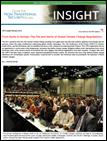 RSIS Centre for Non-Traditional Security (NTS) Studies, February 2012. RSIS Centre for Non-Traditional Security (NTS) Studies, February 2012.
The 2011 outcomes from the UN’s annual climate change meetings have again been met with both cautious optimism and charges that the process shows few signs of effectively addressing global climate challenges. The 17th Conference of the Parties (COP17) in Durban, South Africa, saw this dichotomy take on amplified relevance in the shadow of an expiring Kyoto Protocol.
This NTS Insight takes this as an opportunity to review some of the fundamental structures that define climate change mitigation efforts at the international level, and to illuminate some of the primary points of contention that have dogged international negotiations from their inception. It argues that, while the COP17 did take steps to address some important foundational fracture points, the divisions that have long defined climate change diplomacy will not dissipate quickly. Policymakers would do well to consider this likelihood when accounting for the trajectory of future climatic changes. |
|
Regional Implications of National Reconciliation in Myanmar
 Lina Gong, NTS Alert, Lina Gong, NTS Alert,
RSIS Centre for Non-Traditional Security (NTS) Studies, March 2012.
This NTS Alert examines the implications of Myanmar’s recent reforms for its neighbours – China, India, Thailand and Bangladesh. Issues of major concern to the four countries include energy, humanitarian consequences and other non-traditional insecurities resulting from Myanmar’s internal challenges. The recent reforms, which advance democracy and national reconciliation, are seen to address these long-standing issues and are universally encouraged by Myanmar’s neighbours. Nevertheless, they represent just small steps forward, and more efforts are needed to achieve national reconciliation. |
|
Politics and Distrust in the Rice Trade: Implications of the Shift towards Self-sufficiency in the Philippines and Indonesia
Sally Trethewie, NTS Alert,
RSIS Centre for Non-Traditional Security (NTS) Studies, February 2012.

The volatility and instability in the rice market during the 2007–2008 food price crisis prompted two key rice importers, the Philippines and Indonesia, to pursue rice self-sufficiency with the aim of stabilising domestic rice supply and prices. This NTS Alert examines the impact of these actions for domestic and regional food security in terms of rice supply. It argues that the two countries’ measures to increase production could improve stability and trust in the rice trade if, in their new-found positions of confidence as producers, they spearhead efforts for deeper, more open engagement in the world rice market. |
|
ENGOs’ Bitter Pill: Adapting to Incremental Climate (Governance) Change
Sofiah Jamil, NTS Alert,
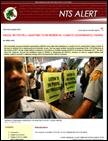 RSIS Centre for Non-Traditional Security (NTS) Studies, January 2012. RSIS Centre for Non-Traditional Security (NTS) Studies, January 2012.
Environmental non-governmental organisations (ENGOs) have often been depicted as a section of civil society that is highly critical of the lack of political will in addressing environmental issues. This was again evident during the proceedings of the 17th Conference of the Parties (COP17) to the United Nations Framework Convention on Climate Change (UNFCCC) in Durban in December 2011. This NTS Alert discusses the limitations faced by ENGOs in influencing the UNFCCC process, as well as suggests options that ENGOs ought to consider in effecting change within and beyond the UNFCCC process. |
|
Aquaculture
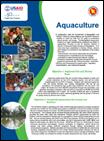 Worldfish Center, Brief, 2012. Worldfish Center, Brief, 2012.
The Bangladesh Aquaculture Project is a five-year transformative investment by USAID in aquaculture, focused on the 20 southern districts in the Barisal, Khulna and Dhaka divisions of Bangladesh. The objectives of the project are to: (1) improve fish and shrimp seed quality and availability; (2) increase farm household pond and homestead production to raise incomes and improve nutrition; (3) increase investment, employment and growth through support to commercial fish, shrimp and prawn production; and (4) work with the government to support policy, regulatory implementation and institutional capacity. |
|
Aquaculture and Fish Consumption in Bangladesh
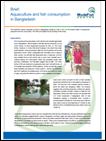 Worldfish Center, Brief, 2012. Worldfish Center, Brief, 2012.
The WorldFish Center conducted a review in Bangladesh funded by IFAD (International Fund for Agricultural Development) in 2011 on the present status of aquaculture production and fish consumption. This brief summarises the key findings. One of the findings is that expenditure on fish among consumers in major cities is close to twice that of those in rural areas. Surveys conducted for this review suggest a growing division between rural and urban fish consumption patterns. |
|
CGIAR Research Program on Aquatic Agricultural Systems: Gender Strategy – A Transformative Approach to Gender Mainstreaming
 Worldfish Center, Brief, 2012. Worldfish Center, Brief, 2012.
Observations from decades of development activity underline the critical role of women’s participation and empowerment in increasing the productivity of agricultural systems, the sustainability of the natural resource base upon which this productivity depends, and ensuring livelihoods, food security and nutrition needs of household members – all of which contribute to poverty reduction. Much of the development community today recognises that achieving gender equity in agricultural research and development is not only a social justice or rights issue affecting women but is critical for achieving development outcomes for society as a whole. Despite this greater awareness, moving beyond the rhetoric and the well-intentioned efforts in targeting and empowering women within development interventions remains a challenge. |
|
Green Economy in a Blue World
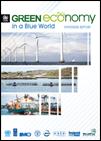 Worldfish Center, Report, 2012. Worldfish Center, Report, 2012.
This report analyses how key sectors that are interlinked with the marine and coastal environment (the blue world) can make the transition towards a Green Economy. The report covers the impacts on and opportunities for shipping, fisheries, tourism, marine-based renewable energies and agriculture. The findings underline that a shift to sustainability in terms of improved human well-being and social equity can lead to healthier and more economically productive oceans that can simultaneously benefit coastal communities and ocean-linked industries. |
^ To the top
Commentaries and News Articles
Interview with Jasmine-Kim Westendorf from the Women on the Line Programme
on her research which has been published in the Institute for Human Security (IHS) working paper,
‘Women, Peace and Security: Moving from Rhetoric to Action’, 3 February 2012
Domestic Security in China: The Xinjiang Quagmire
Arabinda Acharya and Wang Zhihao, RSIS Commentaries, No. 44, 15 March 2012
Legal Reform in China: Quelling Tibetan Unrest?
Irene Chan, RSIS Commentaries, No. 45, 15 March 2012
Xinjiang: Defusing Tensions through Development
Gianna Gayle Amul, RSIS Commentaries, No. 34, 23 February 2012
China’s Food Security: Threats from Conflicts of Interest
Zhang Hongzhou, RSIS Commentaries, No. 32, 22 February 2012
Beyond Ceasefires: Myanmar's Precarious Peace Process
Kyaw San Wai, RSIS Commentaries, No. 30, 21 February 2012
The Road to Rio+20: Ambitious Goals for Sustainable Development?
Ong Suan Ee, RSIS Commentaries, No. 27, 16 February 2012
The Rio+20 Summit and ASEAN: Towards a Green Economy
Paul Teng, RSIS Commentaries, No. 26, 16 February 2012
Myanmar’s Reforms: The Challenges Ahead
Kyaw San Wai, RSIS Commentaries, No. 15, 18 January 2012
India’s Food Security Bill: A Waste or Win for the Hungry?
Sally Trethewie, RSIS Commentaries, No. 12, 16 January 2012
Malaysia-Singapore Energy Cooperation: Prospects and Challenges
Alvin Chew, RSIS Commentaries, No. 7, 10 January 2012
Traditional and Non-Traditional Security: Exploring Conceptual and Practical Challenges
J. Jackson Ewing, Paper presented at the 14th Asian Security Conference on NTS Challenges: Today and Tomorrow, Institute for Defence Studies and Analyses, New Delhi, 13–15 February 2012
Myanmar President Pledges Commitment to Reform
Interview with Alistair D.B. Cook, The Straits Times, 31 January 2012
Myanmar’s Road to Democracy
Alistair D.B. Cook and Bridget Walsh, The Straits Times, 17 January 2012
India’s Food Security Bill: A Waste or Win for the Hungry?
Sally Trethewie, Reliefweb, 16 January 2012
Plenty of Fish in the Sea?
Stephen Hall, Worldfish Center blog, 2 March 2012
^ To the top
|